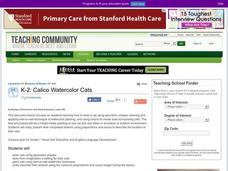Big Kid Science
Measuring Shadows Using an Ancient Method
How did ancient peoples determine the height of really tall objects? Young scientists and mathematicians explore the concept of using shadows to measure height in a hands-on experiment. Paired pupils measure shadows, then calculate the...
Curated OER
Fossil Formation
A fossil is worth a thousand words! Individuals craft their own amber fossil of an insect in addition to molds and casts of seashells. A third activity takes the lesson a notch higher: Learners measure stride lengths between tracks and...
Teachers.net
Gingerbread Man Glyph from Mailbox Magazine
Follow crafty glyphs to create a one-of-a kind gingerbread man based on personal information such as the color of eyes, number of siblings, and more!
Education Outside
Birder - Watcher
Take the class outside with a bird watching lesson. Young ornithologists participate in an outdoor activity that guides them on how to observe and study the feathered animals. After walking around school campus, bird watchers provide a...
American Chemical Society
Designing a Shade Structure
Bring the learning outdoors with an enjoyable activity about Earth's heating, sunlight, and shade. Scholars use problem-solving skills as they design, build, and test a sunshade structure. Participants view a video summarizing the...
Curated OER
Electricity and Magnetism: From Fun to Function
Fourth graders experiment with electricity and magnetism and build an electromagnetic motor. In this electromagnetism lesson, 4th graders use household objects to show electrostatics and magnets and compasses to show magnetism. They...
Curated OER
Invasives and Macroinvertebrates
Students view macroinvertebrates, or discuss previous collection activity. They graph data on macroinvertebrates in the Hudson River. Students discuss the relationship between habitat, environmental changes, and invertebrate diversity or...
Curated OER
Calico Watercolor Cats
A fun art project, this lesson plan incorporates math and listening skills as young artists play with a new painting technique. First the teacher models how to draw a cat using shapes, an oval for the body, triangles for the ears and so...
Curated OER
Mouse...Mouse...Snake!
Use this activity as an anticipatory set to warm up for a lesson plan on predator/prey relationships. Pupils will play a round of "Duck, Duck, Goose," substituting the ducks and geese for two animals that have a predator/prey...
Curated OER
Using Light and Shadow to Create a Sense of Character
Pupils heighten awareness and mastery of the subtle factors of drawing technique. Activities focus solely on the human figure, particularly the face. students list 5 of elements of light and shadow which affect portrayal of character and...
Curated OER
Frisbee Horseshoes
What a great way to practice the art of throwing a Frisbee! This Frisbee Horseshoes instructional activity could be used as a warm-up or it could be made into an entire instructional activity. If the cones were placed different...
Nuffield Foundation
Biodiversity in Your Backyard!
Take your enthusiastic ecologists outdoors to explore the biodiversity right in their own schoolyard! In preparing for this activity, it may be worthwhile to research websites with local flora to help in the plant identification portion.
Curated OER
Tennis Ball Prints
Students experiment using abstract art techniques, tennis balls, and tempera paint in this excellent, outdoor art activity for the early-elementary classroom. The resulting art prints can be displayed predominantly in the classroom.
Curated OER
Cartesian Coordinates
Students investigate rational numbers through data analysis and statistics. For this algebra lesson, students represent, rename, compare and order rational numbers. They collect and represent data correctly on a graph.
Curated OER
The Colors of Nature
Students explore their outdoor environment, looking for varieties of color. Color samples from the outdoor environment are collected and used to create a sample page of colors that students label.
Curated OER
Native Plants: An Outdoor Scavenger Hunt
Students recognize various California native species by their physical appearances and characteristics. They recognize the adaptations that plants make to their surroundings and how humans make use of plants.
Curated OER
Safety Lesson
Students review or introduce personal safety concepts in a variety of areas common to the lives of students.
Captain Planet Foundation
Sorting Out Soils
Sift through soil and learn about why it's important for organic processes. After discussing what makes up soil, such as the living organisms and what types of soil have more nutrients, kids sample layers of mulch and deeper soil to...
Curated OER
Personal Safety
Fifth graders design an accident chain to show indoor and outdoor safety precautions. For this safety lesson plan, 5th graders also take a quiz that is not provided.
Curated OER
"Walk the Talk"
Learners realize that it is critical that they not miss opportunities because they lack a required uniform. They discuss at length about the need for having active lifestyles even though they lack the appropriate clothers for the...
Curated OER
Mud Painting
Learners invent mud mixtures to paint with. In this mud painting lesson, students experiment with different mixtures to develop the perfect mud paint. Learners paint a picture.
Curated OER
A Mural Gift
Students listen as the teacher tells about the life of Keith Haring. Using drawing paper and pencils, they sketch figures and shapes in the style of K. Haring. They discuss the mural with students, and they vote on colors to use....
Curated OER
Living and Nonliving
Students use their senses to record and collect data. In How Do I Classify Things in My World?, students practice classifying objects as living or nonliving. In Is it Real Or Pretend?, students group objects as real or pretend. In What...
Curated OER
Living and Nonliving Things
Students photograph five objects from a bag and five objects from the outdoors. Students categorize things by living and non-living and by properties such as color, size, structure and needs. Students draw conclusions about the basic...

























